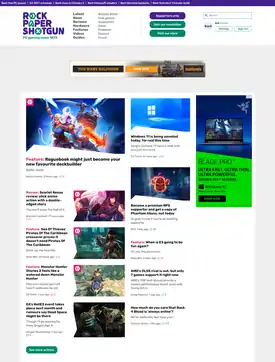Rock Paper Shotgun
Rock Paper Shotgun[lower-alpha 1] is a British video game journalism website. It was launched in July 2007 to focus on PC games and was acquired by Gamer Network, a network of sites led by Eurogamer, in May 2017.[1][2]
 | |
 Rock Paper Shotgun homepage as of 24 June 2021 | |
| Type of business | Subsidiary |
|---|---|
Type of site | Video game journalism |
| Headquarters | Brighton, England |
| Owner | Gamer Network |
| Founder(s) |
|
| Editor | Katharine Castle |
| Industry | Video game industry |
| URL | www |
| Registration | Optional |
| Launched | 13 July 2007 |
| Current status | Active |
History
Rock Paper Shotgun was founded by Kieron Gillen, Jim Rossignol, Alec Meer and John Walker in 2007. All four were freelancing for Future Publishing and wanted to create a website focused entirely on PC games.[3]
Gillen announced that he would no longer be involved in posting the day-to-day content of Rock Paper Shotgun in 2010,[4] focusing more on his work with Marvel Comics. He continued to act as a director and occasionally write essay pieces for the site. Rossignol founded his own game studio, Big Robot, in 2010,[5] but also continued to contribute to the site for six more years. Meer and Walker left in 2019.[6][7]
Rock Paper Shotgun contributors include:
Controversies
Fox News and Bulletstorm
On 8 February 2011, the game Bulletstorm came under scrutiny by Fox News through two articles by journalist John Brandon, describing the game as the worst game in the world.[8][9] The game was targeted because of its profanity, crude behaviour (examples of which including the game's skill-shot system, which has a move that rewards players for shooting at an enemy's genitals), and sexual innuendo. Alongside the panel of Fox News anchors was the psychiatrist Carole Lieberman, who remarked: "Video games have increasingly, and more brazenly, connected sex and violence in images, actions and words. This has the psychological impact of doubling the excitement, stimulation, and incitement to copycat acts. The increase in rapes can be attributed, in large part, to the playing out of such scenes in video games." Other claims included that the game could reach audiences as young as nine years old, and that the gore and profanity could seriously traumatise a child of that age group.
These claims were largely ridiculed among gaming websites, including Rock Paper Shotgun, who ran a series of articles discrediting the reports by Fox News.[7] The articles analysed Lieberman's claims and found only one of eight sources she provided had anything to do with the subject at hand. Fox News acknowledged that they had been contacted by Rock Paper Shotgun and responded to their claims on 20 February 2011 through another article, stating that the game still remained a threat to children.[9]
Public domain article
In 2014 a Rock Paper Shotgun article by John Walker about the existence of orphaned classic video games, and the suggestion to let them enter the public domain after 20 years, raised a controversial public debate about copyright terms and public domain[10][11][12] between game industry veterans John Walker, George Broussard and Steve Gaynor.[7][13][14]
Notes
- also rendered Rock, Paper, Shotgun
References
- Pearson, Dan (3 May 2017). "Gamer Network acquires Rock, Paper, Shotgun". GamesIndustry.biz. Archived from the original on 3 May 2017. Retrieved 3 May 2017.
- RPS (13 July 2007). "The Website That Saved The World". Rock Paper Shotgun. Archived from the original on 30 June 2019. Retrieved 30 June 2019.
- "The Secret History Of Rock Paper Shotgun - Part One: Matters Of Import". Rock Paper Shotgun. 8 April 2019. Archived from the original on 28 September 2020. Retrieved 15 September 2022.
- "Half-Life: On Turning 35 And Leaving RPS". Rock Paper Shotgun. 30 September 2010. Archived from the original on 9 November 2020. Retrieved 15 September 2022.
- Rossignol, Jim (27 September 2010). "Big Robot Lives Again". Big Robot. Archived from the original on 30 March 2019. Retrieved 21 April 2012.
my new company, Big Robot
- Smith, Graham (9 April 2019). "Thank you and goodbye, Alec Meer". Rock, Paper, Shotgun. Archived from the original on 13 August 2020. Retrieved 21 September 2020.
- Walker, John (18 April 2019). "Bye-bye RPS, thanks for having me". Rock, Paper, Shotgun. Archived from the original on 23 October 2020. Retrieved 21 September 2020.
- Brandon, John (8 February 2011). "Is Bulletstorm the Worst Video Game in the World?". Fox News. Fox News Network. Archived from the original on 13 June 2016. Retrieved 26 June 2016.
- Brandon, John (20 February 2011). "Bulletstorm: Censored in Germany, Coming to America". Fox News. Fox News Network. Archived from the original on 11 August 2016. Retrieved 26 June 2016.
- Walker, John (29 January 2014). "GOG's Time Machine Sale Lets You CONTROL TIME ITSELF". Rock Paper Shotgun. Archived from the original on 2 November 2015. Retrieved 30 January 2016.
As someone who desperately pines for the PD model that drove creativity before the copyright industry malevolently took over the planet, it saddens my heart that a game two decades old isn't released into the world.
- Walker, John (3 February 2014). "Editorial: Why Games Should Enter The Public Domain". Rock Paper Shotgun. Archived from the original on 16 April 2016. Retrieved 30 January 2016.
...games more than a couple of decades old aren't entering the public domain. Twenty years was a fairly arbitrary number, one that seems to make sense in the context of games' lives, but it could be twenty-five, thirty.
- Why Games Should Be In the Public Domain Archived 17 June 2016 at the Wayback Machine on slashdot.com
- George Broussard Archived 1 April 2014 at the Wayback Machine on Twitter "@wickerwaka The whole thing, really. But especially that. Whoever allowed that to be printed should be fired."
- Copyright, trademark & money in a creative industry Archived 2 May 2016 at the Wayback Machine on gamasutra.com by Steve Gaynor "There is some argument going on about for how long a copyright holder should be able to charge exclusively for their own work, before it enters the public domain. John Walker argues that perhaps a good cutoff would be 20 years before an 'idea' enters the public domain." (February 03, 2014)